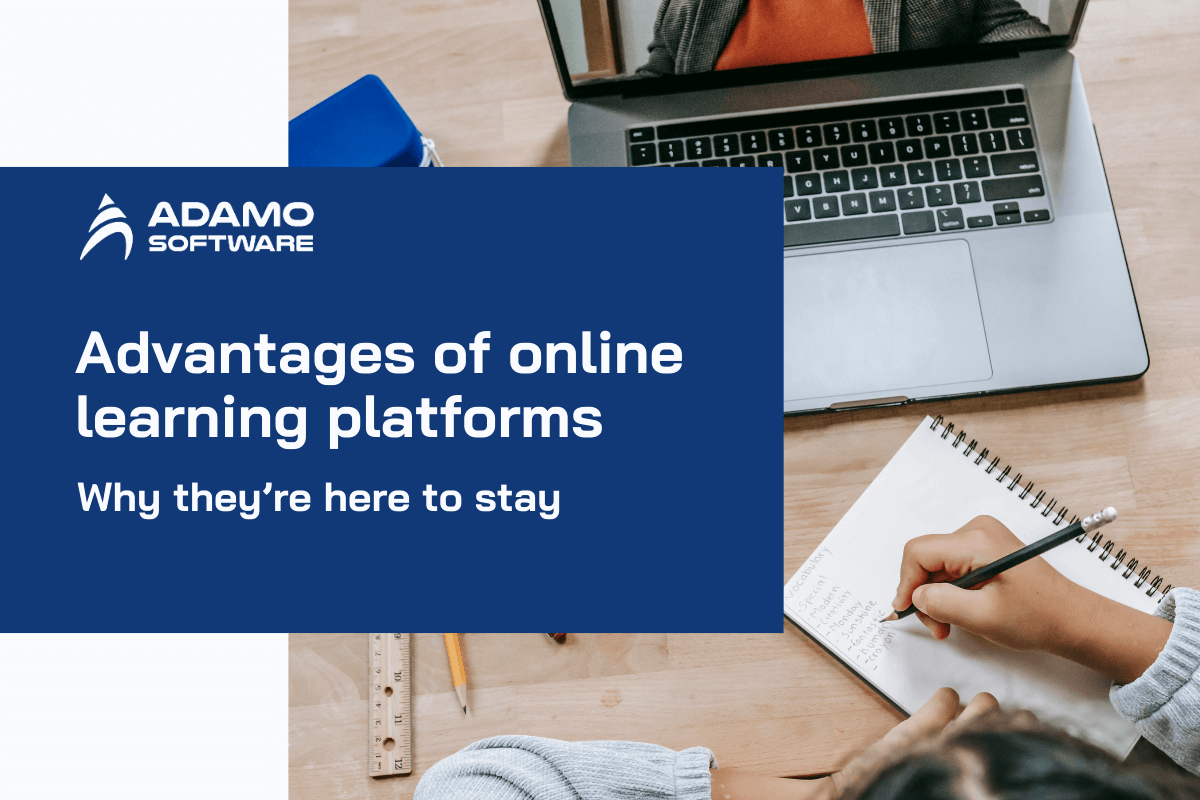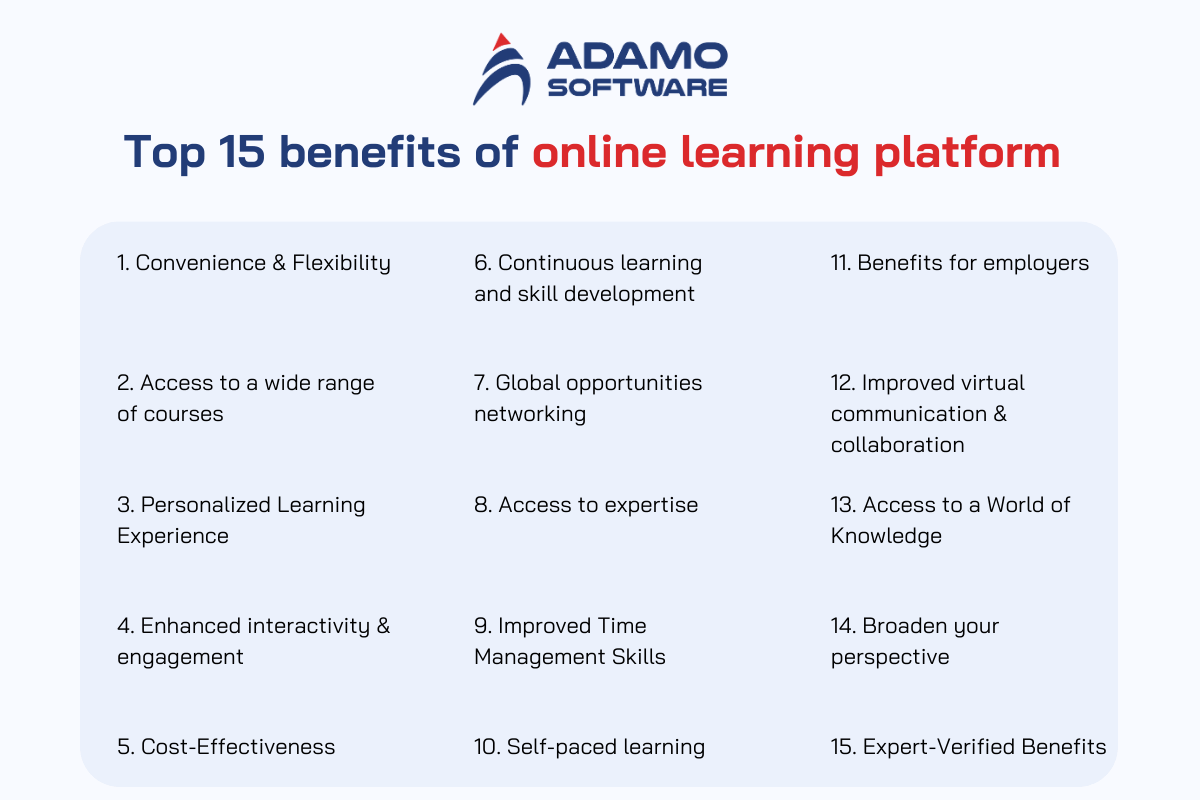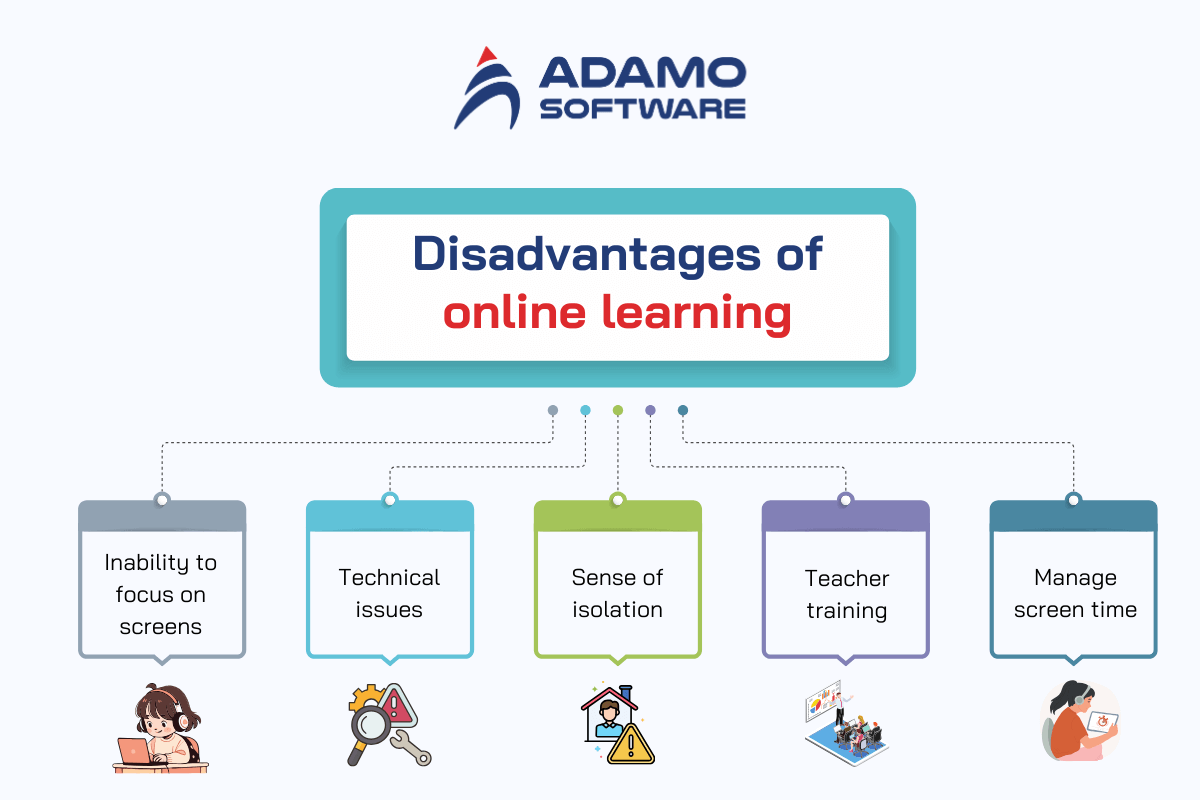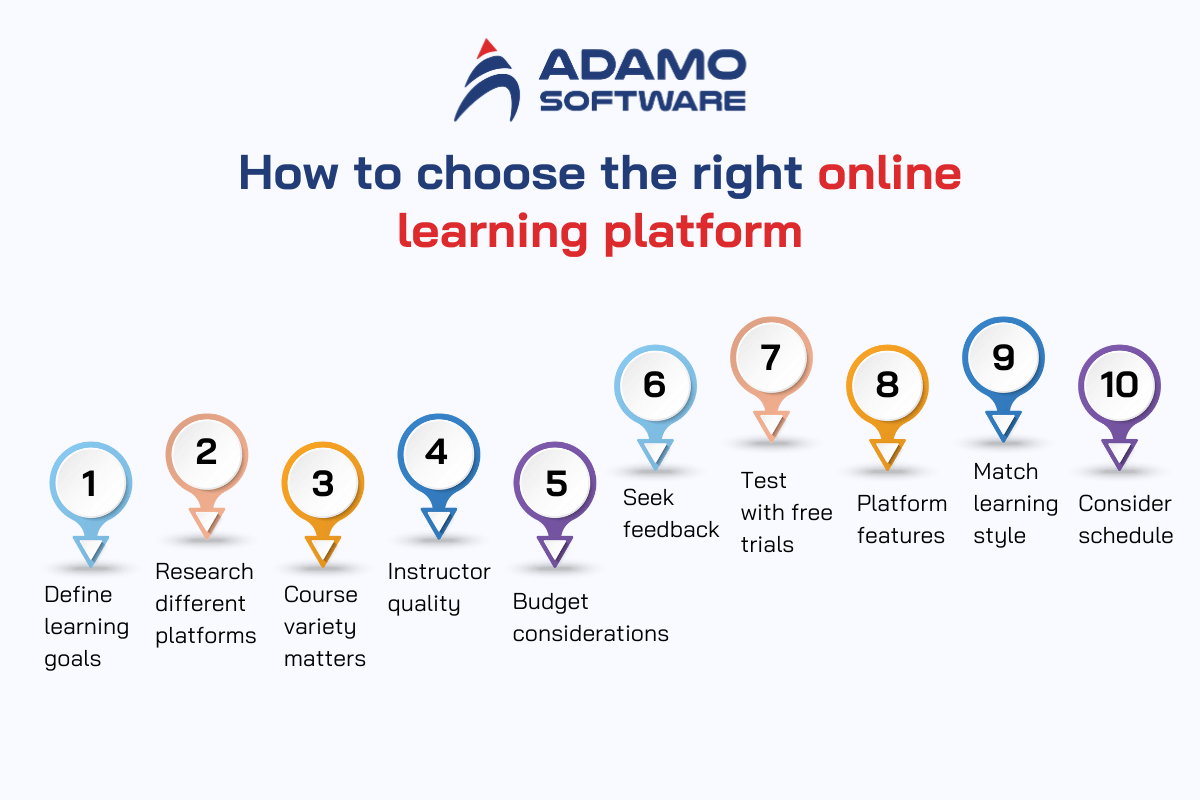Advantages of online learning platforms: Why they’re here to stay

Online learning platforms are becoming extremely popular among learners of different ages worldwide. That’s because of the flexibility and many other benefits that they bring to the table.
This article will review the advantages of online learning platforms to see why they are so important. We’ll also give you tips on choosing a suitable platform for your educational institution.
I. Advantages of online learning platforms: How does it work?
Online learning platforms are web-based learning systems that help learners access their learning resources, courses, and other learning tools outside the classroom. These platforms deliver content in the form of video lectures and online quizzes. They also have discussion forums and allow users to download lessons.
You can access these platforms on many devices like computers, mobile phones, and tablets. Hence, you can study independently at any time and place that suits you, showcasing the advantages of online learning platforms.
Online learning platforms have many benefits, so they are popular among students and other professionals. Learners from around the world can attend these classes anytime they want. This flexibility enables one to schedule time for learning amidst other activities, underscoring the advantages of online learning platforms.
Another advantage is cost efficiency. Online courses are indeed often cheaper than offline education. It is even better that they do not require students to travel or stay in another city. Additionally, online learning platforms provide learners with courses in various fields to expand their knowledge and skill set. This is also one of the advantages of online learning platforms.
But how do these platforms work?
First, learners must sign up for a course or an account and then search for classes offered. Some courses may provide professional certifications, while others may be more of a personal development nature, thus satisfying everyone’s needs.
The students receive materials such as video lessons, articles, assignments, and tests on registration. These resources are usually on call, meaning learners can take a particular portion of a course at a time. As mentioned, flexibility is one of the most essential advantages of online learning platforms.
Features like discussion forums and chat boxes help the learners and instructors engage with each other and with other learners. Many platforms have features that enable learners to track their progress, submit their work, and get feedback. For example, quizzes and assessments help review the effectiveness of one’s learning process, showcasing the advantages of online learning platforms.
Online learning platforms are a convenient and efficient means to continue education in the modern world. That’s why knowing the various advantages of online learning platforms is so important. Let’s discover the top 15 benefits that they can offer right below.
II. Top 15 benefits of online learning platforms

1. Convenience and Flexibility
Flexibility is one of the significant benefits of teaching-learning through online learning platforms. Compared to conventional classrooms, students can download the course contents, video lectures, and assignments conveniently using online platforms. This is one of the critical advantages of online learning platforms.
This flexibility also enables the learners to study at any time of the day they prefer. Therefore, they are not required to attend classes at 8 in the morning as in conventional classrooms. To a learner with work, family, or any other responsibilities, online learning provides a perfect chance to pursue education.
Because of the convenience that they bring, online learning platforms have become so prevalent. It further illustrates the advantages of online learning platforms.
2. Access to a wide range of Courses
An essential aspect of the benefits of using online learning platforms is the availability of numerous courses in various fields.
Students can easily find a course they are interested in, be it an academic course or a vocational course. In contrast to the limitability of courses in traditional schools, students can access specialized subjects and further advanced courses.
This is because the availability of the material enables students to practice in the areas of interest and expand their knowledge. Therefore, online learning platforms are beneficial in learning throughout people’s lives and pointing out the advantages of online learning platforms.
3. Personalized Learning Experience
Learning environments in e-learning are likely to integrate adaptive learning technologies in a bid to satisfy the learners. These are advantages of online learning platforms since they bring a more practical and personalized approach to each learner.
4. Enhanced Interactivity and Engagement
Some even argue that online courses are less engaging than face-to-face class setting arrangements. However, many environments of online learning promote high interactivity.
Students interact with students from other parts of the world through virtual classes, discussion forums, and group assignments. Web-based media also incorporates different forms of multimedia, such as teaching a lesson through videos, quizzes, games, and various playing methods to capture the students’ attention.
These features make the online learning experience as exciting as it can be. They also provide evidence that the advantages of online learning platforms can help make the digital learning experience as effective as face-to-face learning.
5. Cost-Effectiveness
One of the advantages of online learning platforms is that they are relatively less expensive than normal learning platforms.
Traditional colleges or universities require students to pay for tuition, textbooks, transportation, and accommodation, among other costs. On the other hand, most online courses are more affordable. Some are even free, making the cost of education inexpensive or even accessible.
Moreover, other expenses like transport and accommodation are not incurred while studying online, which makes it easier for people to attend online classes. In this regard, the advantages of online learning platforms are critical in ensuring that quality education is available to many people.
6. Continuous Learning and Skill Development
This is a significant advantage of online learning platforms since they enable students to learn and develop new skills anytime.
If traditional programs are time-bound degree programs, online learning presents several short courses, certifications, and specific courses. This enables the person to continue learning about current trends in the industry, embrace recent technology, or acquire other relevant skills.
Whether an individual seeks to advance in their current profession or change career paths, the advantages of online learning platforms are prominent. Therefore, online learning platforms are necessary for career and self-development in today’s dynamic job market.
7. Global Opportunities Networking
Another benefit of online learning platforms is the opportunity to engage with learners and working professionals worldwide. Some opportunities include networking sessions, discussion forums, and social network groups where students can interact with other students and professionals from different countries.
This global interaction allows people of diverse cultures to connect and share ideas and knowledge. For students wanting to expand their network of potential employers, the advantages of online learning platforms provide a direct means of achieving that goal. The global nature of these platforms enriches the learning experience and opens doors to new possibilities.
8. Access to Expertise
E-learning systems enable students to learn from teachers and other specialists of their choice, irrespective of their geographical location. This is one of the significant advantages of online learning platforms. Some courses are delivered by experts or professionals from the field, bringing practical knowledge to the classroom. Because of it, students are able to get information they may not be able to get locally.
Therefore, the advantages of online learning platforms enable students to gain a quality education that can help improve their skills and knowledge. No matter what the subject of learning is—whether a technical subject or an art subject—the learner gets the expertise and experience from professional experts, enhancing the learning process and making it much more valuable.
9. Self-Paced Learning
Flexibility is one of the biggest strengths of online learning platforms. This means learners do not have to stick to a strict timetable like in traditional classes; instead, they go through the material at their own pace. This flexibility enables students to revisit areas with complex concepts several times or dwell on areas that a student finds difficult.
To the fast learners, the self-paced learning of the online courses is the perfect feature. They can complete their education at their own pace without waiting for other candidates. This flexibility is one of the critical advantages of online learning platforms. It makes it easy to address individual learning needs and increases knowledge and self-confidence in the material covered.
10. Improved Time Management Skills
Another obvious benefit of online classes is that students learn how to manage their time using the Internet tools available for learning. It requires the student to be disciplined because there is always no set time when one has to be in class. This involves time organization, motivation, and planning so that deadlines and coursework are met as scheduled.
Over time, the student is able to learn how to properly arrange the activities, schedule the time, and even adhere to a proper timetable. All these time management skills are helpful in the academic context and professional life. Once again, the advantages of online learning platforms are proven.
11. Benefits for Employers
It is also important to note that using online learning platforms benefits employers in the following ways. That’s why organizations that provide the opportunity for distance learning for their employees can train a more qualified and informed staff. It also costs less to the employers than traditional training, where employers are supposed to provide costly training.
Furthermore, the targeted employees who engage in the online learning process are motivated, practical, and have organizational commitment. This is because they feel encouraged to develop in their careers. This can lead to improving the turnover of employees and enhancing the performance of the organization. Therefore, the advantages of online learning platforms make it possible for both employees and employers to consider adopting this solution.
12. Expert-Verified Benefits
The advantages of online learning platforms have been supported by many research studies. For instance, a study by the National Center for Education Statistics in 2019 confirmed their benefits. It was revealed that students’ enrollment in online classes is motivated by flexibility and convenience.
On the other hand, the College Board, in a study conducted in 2020, further showed that the cost of online courses is cheaper than that of the conventional system. Thus, the present study highlights the importance of online education in delivering quality education that is affordable, convenient, and flexible.
Such findings, which experts have approved, confirm that the advantages of online learning platforms make them an effective modern way of learning.
13. Access to a World of Knowledge
Another advantage of online learning platforms is that they open students to many courses, which is a privilege.
According to the Online Learning Consortium survey conducted in 2019, an online student has up to 10,000 class options. This broad selection allows the learners to select the courses that suit them and the areas of interest of the learners.
The fact that this variability is available shows that the advantages of online learning platforms guarantee that there is always something for everyone.
14. Broaden your perspective
Online learning environments encourage engaging with students from all over the world, hence enhancing cultural richness. This is because learning involves communication with other students. This interaction introduces them to different ideas, trends, and perspectives worldwide.
This can enhance interactions on social media platforms and the quality of education provided. Exposure to innovative ideas gives students a better perspective on life and their careers; they are better prepared for the international market.
This community aspect shows the advantages of online learning platforms in providing students with a diverse setting to learn about global issues. Thus, it helps make the education process more constructive and informative.
15. Improved virtual communication and collaboration
Other advantages of online learning platforms include improved virtual communication and collaboration.
With online courses, learners can participate in discussions, work on projects, and interact professionally with instructors and other learners. These experiences are valuable for the students to become influential writers, concise presenters, and virtual team members.
In an online learning environment, students are taught to use application software, collaborate virtually, and enhance professional/practical communication skills. This further highlights the advantages of online learning platforms in preparing learners for the current world of work.
III. Some major disadvantages of online learning

1. Inability to Focus on Screens
One of the first challenges is that it is hard to focus on a screen for many hours, especially when learning online. It’s easy to get distracted by other social networks or sites while learning online.
Therefore, teachers must ensure that their online teaching sessions are brief and engaging enough to capture learners’ attention.
2. Technical Issues
One of the main problems with online classes is that there needs to be an internet connection. Though the internet connection has grown like wildfire in recent years, getting a reliable internet connection with good browsing speed is still a problem in small towns and villages. Pupils or teachers may only always have access to the Internet, which sometimes disrupts children’s learning process. This is not good for the learning process.
3. Sense of Isolation
That is why being in the company of their peers can teach the students a lot. Nevertheless, there is almost no contact between students and teachers in the context of an online class. This leaves the students feeling lonely. In this case, the school must provide other means to communicate with students, classmates, and teachers. This can include things like online messaging, emails, and video conferencing, which makes it possible to meet face-to-face and reduces feelings of loneliness.
4. Teacher Training
Teachers should have a rudimentary knowledge of applying the various forms of digital modes in online teaching. But this is only sometimes so. Teachers may need to be better informed on technology and only see the concept. They only sometimes have the means and equipment to provide online classes. To overcome this, schools should allocate resources to ensure that teachers receive the best technical training that will enable them to instruct their students online effectively.
5. Manage Screen Time
Most parents have concerns about the health consequences of their children spending much time in front of a screen. Another adverse effect and issue intricately connected with the usage of digital learning environments is the increase in the amount of time spent in front of screens. This position causes the students to develop incorrect posture and other related problems since they spend most of their time in front of a screen.
IV. How to choose the right online learning platform

1. Define Your Learning Goals
First, it is necessary to define the goal that must be set. What do you want to learn as a student and which skills do you want to enhance? It is also essential for you to understand your objectives so that you will be able to make the right decision.
2. Research Different Platforms
There are so many online learning platforms, each with advantages and disadvantages. Consult customer reviews, compare the features, and use free trials to choose the right platform for your business.
3. Course Variety Matters
A platform with various courses will make it easier to find content that interests one. For knowledge enhancement, seek sites that have a variety of options.
4. Instructor Quality
Quality lesson delivery is critical in learning. When selecting the platforms, consider the trainers and make sure they are qualified to teach. They can also provide information about the quality of instruction given to students.
5. Budget Considerations
As has been demonstrated, there are many online learning platforms, and the prices may vary from free to paid. Choose the platform that will cost you what you are willing to spend and that is consistent with the objectives of your education.
6. Seek Feedback from Peers
Opinions of other learners may help understand the process of learning better. Never miss out on the experience of your contemporaries as they share their knowledge with different online learning platforms.
7. Test with Free Trials
Some platforms have free trials where users can interact with the platform and get a feel for what is available before they pay. Make the most of these trials to ascertain that the platform caters to your learning needs.
8. Platform Features
Think about each platform’s options: some offer live chat, discussion forums, and the possibility to download the course material. Select the platform most appropriate to your choices.
9. Match Your Learning Style
Each medium is suited to a particular style of learning. If you are more of the visual type, then be sure to go with platforms that offer video classes. Applying your choice according to the kind of learner will help to improve your experience.
10. Consider Your Schedule
Some of the platforms provide more flexibility in the course timetable. The best platforms should be those that offer courses that one can take with ease since they are time-bound due to their busy schedules.
Also read: Explore best examples of online learning platforms for all use cases
V. Adamo provides stellar service to streamline the online learning platform experience
Adamo Software optimizes the online learning platform by enhancing the interface with easy, simple, and adaptive solutions. Focusing on cloud-based Learning Management Systems (LMS) and mobile applications, we make it easy for students and teachers to benefit from the advantages of online learning platforms. To support engagement and achievement, our developers focus on navigation, learning experience, and collaboration tools integrated in real-time.

By leveraging AI and cloud storage, we enhance the learners’ experience and make the administration and reporting of the courses more efficient. Adamo ensures the platform is customized to your institution’s needs to make learning as compelling and exciting for users as possible.
Want to take your online learning platform to the next level? Contact us today to learn how to improve your educational experience with our experts in educational software development.
FAQs
1. How should you choose an online course platform?
If you are a student, select a cheap online course platform with a high rating among students and instructors.
If you are a course creator, choose the convenient platform for both you and your students. Ensure it is affordable and has a transparent pricing policy and content formats.
2. What online learning platform do most colleges use?
According to Phil Hill & Associates, Canvas will take up the highest LMS market share in higher education institutions in North America by 2023 (41%). Blackboard follows the trend with 17% of the institutions, while Moodle and D2L Brightspace are in third place with 16% each.
3. What is the most popular online course platform?
Some of the most visited online course platforms include the following: Khan Academy, with about 165 million users; Coursera, with 142 million; edX, with 86 million; Codecademy, with 85 million; and Udemy, with about 70 million.





